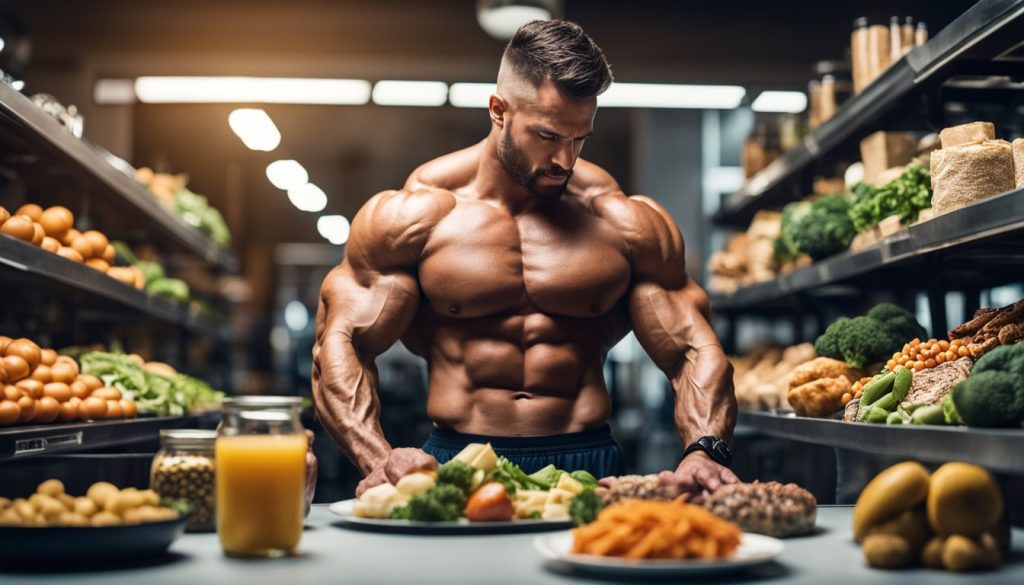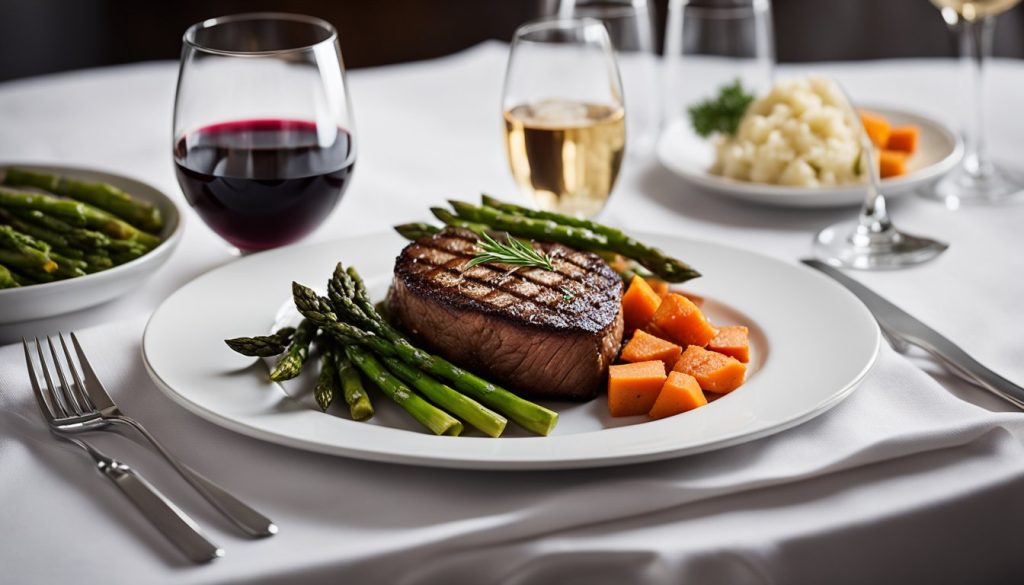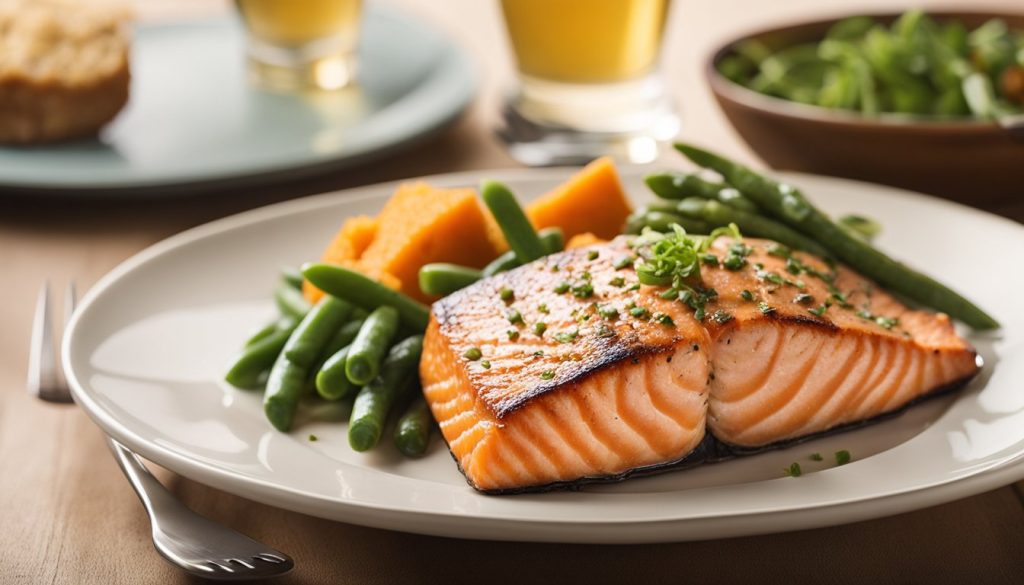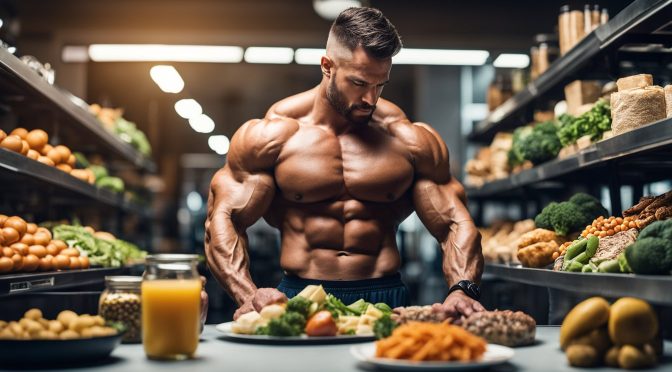Protein-rich muscle foods, a vital nutrient for anyone trying to build muscle mass. As part of a balanced diet, protein supports numerous bodily functions and contributes to overall health. You need enough protein. This is especially true if you’re active or strength training. Your muscles need extra nutrients to recover and grow after workouts.

Protein-rich muscle foods not only help in muscle growth but also provide a range of health benefits. Adding these foods to your diet can ensure you get essential amino acids. Your body cannot make them. Eating a high-protein diet improves satiety. This can aid in weight management. It also boosts metabolic rate, which may increase energy expenditure.
Choosing the right protein sources is paramount. Opt for lean meats, fish, dairy, eggs, and plant-based options like legumes and nuts to diversify your intake. This way of eating supports your muscle-building goals. It also provides many other essential nutrients needed for good health. Control portion sizes. Use a variety of protein sources in your meals. This covers all the essential amino acids and maximizes the benefits of a high-protein diet.
Define Protein-Rich Muscle Foods

When focusing on muscle building, your diet should include foods rich in protein. Protein is essential for muscle repair and growth. Amino acids make up proteins, which are the building blocks that help form muscle tissue.
Poultry: Chicken breast is a staple in high-protein diets. This is because it is low in fat and high in protein. It has about 31 grams of protein per 100 grams.
Seafood: Salmon has a lot of protein—about 25 grams per 100-gram serving. It also has omega-3 fatty acids, which are good for the heart.
Legumes: Beans are an excellent plant-based protein source, offering around 15 grams of protein per cup when cooked. They are also rich in fiber and micronutrients.
Red Meat: While red meat is protein-dense, it’s important to choose lean cuts to minimize saturated fat intake. It’s a good source of essential amino acids vital for muscle maintenance.
Dairy: Both cheese and other dairy products provide high-quality proteins. For instance, cottage cheese contains around 28 grams of protein per cup.
Eggs: Eggs are a versatile protein source. They are highly regarded because they have a complete amino acid profile. They provide about 6 grams of protein per egg.
Nuts and Seeds: Nuts have less protein than animal sources. But, they are a good snack. They add to your overall daily protein intake. They also offer healthy fats and fiber.
Plant-Based Proteins: For those seeking non-meat protein, soybeans can be a great choice. They have about 36 grams of protein per 100 grams. This can really help you build muscle.
Importance of Protein in Muscle-Building
Protein plays a pivotal role in muscle-building, serving as the fundamental building block for muscle tissue. You need protein daily. It fixes and strengthens muscles. They undergo stress during exercise.
The primary components of proteins are essential amino acids, which your body cannot produce on its own. Consuming adequate amounts ensures your body has the necessary ingredients to build and repair muscle. Here’s a breakdown of how protein supports your muscle-building journey:
- Muscle Repair: After working out, your muscles need protein to heal the microtears caused by strenuous activity.
- Growth: Protein stimulates muscle protein synthesis, the process whereby the body builds muscle tissue.
- Hormone Production: Adequate protein is necessary for maintaining the balance of hormones that aid in muscle growth.
For health and muscle growth, your diet should also include vitamins and minerals. They help your body to use protein well. These nutrients work synergistically, enhancing the muscle-building process.
When planning your diet, aim for a variety of protein sources to ensure you receive all the essential amino acids. Below is a reference for achieving a balanced protein intake:
| Source of Protein | Essential Amino Acids | Vitamins & Minerals Present |
|---|---|---|
| Meat & Poultry | Complete | B12, Iron, Zinc |
| Fish & Seafood | Complete | Omega-3, Vitamins D & B2 |
| Dairy Products | Complete | Calcium, Vitamin D, Potassium |
| Plant-Based | Incomplete | Fiber, Antioxidants |
Remember, while protein is key for muscle-building, consuming it in moderation as part of a balanced diet is vital. Too much protein can lead to health issues. So, calculate how much you need based on your activity level and fitness goals.
Protein Content in Food
Consider muscle-building foods. Focus on two key aspects: their essential amino acids and the protein per serving.
Essential Amino Acids
Your body needs essential amino acids that your muscles cannot produce and must obtain from food. Foods like chicken, turkey, and milk are complete proteins. They have all nine essential amino acids needed for protein synthesis. Plant-based options like lentils, edamame, and tofu also provide essential amino acids. But, you may need to mix them with other proteins to get them all.
Grams of Protein Per Serving
To optimize muscle protein synthesis, it’s helpful to know the protein content of your food. A serving size typically refers to the edible portion of food without preparation.
| Food | Protein (per serving) |
|---|---|
| Chicken | 31g (3oz breast) |
| Greek Yogurt | 17g (6oz container) |
| Cottage Cheese | 28g (1 cup, low-fat) |
| Peanut Butter | 8g (2 tablespoons) |
| Lentils | 18g (1 cup cooked) |
| Tofu | 20g (1 cup firm) |
| Turkey | 24g (3oz slice) |
| Milk | 8g (1 cup) |
| Edamame | 17g (1 cup) |
Keep in mind, your diet should include many protein sources. This will ensure you cover all the essential amino acids. For better muscle recovery and growth, include these protein-rich foods in your regular diet.
Recommended Intake for Muscle Growth
To support muscle growth, your protein intake is crucial. Aim for about 1.6 to 2.2 grams of protein per kilogram of your body weight daily, especially if you are an athlete or heavily involved in training. High-quality proteins such as whey and beef are excellent sources to incorporate into your diet.
Whey is a complete protein containing all nine essential amino acids necessary for muscle repair and growth. Various protein powders contain this easily digestible ingredient. For a post-workout boost, consider having a whey protein shake to help your muscles recover and grow.
Meanwhile, beef not only provides high-quality protein but is also rich in important nutrients like omega-3 fatty acids, which can aid in muscle recovery and inflammation reduction. It’s beneficial to choose lean cuts to maximize protein while minimizing excess fat intake.
Nutrients like calcium and magnesium are integral for muscle function and bone health. Ensure your diet includes calcium-rich and magnesium-rich foods to support your muscle-building efforts. Dairy products contain calcium, while nuts, seeds, and leafy greens are abundant in magnesium.
Always tailor your nutrient intake to suit your specific body weight and training regimen. More exercise may require eating more protein. This is to meet the needs of muscle recovery. Listen to your body and adjust as needed to support your muscle growth goals.
Sources of High-Quality Protein-Rich Muscle Foods

Consider high-quality proteins. They are key for muscle building. Focus on both plants and animals.
Animal-based proteins are in lean meats like chicken breast, turkey, and lean cuts of beef or pork. They are excellent sources of complete protein, which has all the amino acids your body needs. Fish, especially fatty ones like salmon, are not only rich in protein but also provide beneficial omega-3 fatty acids.
- Chicken breast: A popular choice for lean protein.
- Salmon: Offers a combination of protein and omega-3s.
Plant-Based Proteins: This is for vegetarians, vegans, or those simply looking to cut animal protein. There are many plant proteins that can support muscle growth.
- Quinoa: Unlike most plant proteins, quinoa is a complete protein, which means it contains all nine essential amino acids. It’s also a good source of fiber and other nutrients.
- Legumes: Beans, lentils, and chickpeas are high in protein. They are also rich in fiber and complex carbs. This makes them very filling.
- Seeds and Nuts: Chia seeds, flaxseeds, hemp seeds, and almonds are high in protein and also contain healthy fats.
To incorporate these into your diet:
| Food Item | Protein Content | Tips |
|---|---|---|
| Quinoa | Complete protein, high in fiber | Add to salads or use as a rice substitute. |
| Beans and Lentils | Rich in protein and fiber, versatile | Include in soups, stews, or as a side dish. |
| Seeds | Good source of protein and essential fatty acids | Sprinkle on yogurt or blend into smoothies. |
Protein Content and Benefits for Muscle Health
Proteins are the building blocks of your muscles. Specific nutrients are critical for muscle health. A balanced diet has high-quality, protein-rich foods. These foods help muscles repair, grow, and stay healthy.
Lean Protein Source with High Amino Acid Leucine Content
Lean proteins such as chicken breast, turkey, and fish are excellent sources of leucine. Leucine is an essential amino acid that plays a pivotal role in muscle protein synthesis. For instance, a 3-ounce serving of chicken breast offers about 2.7 grams of leucine. These sources are also low in saturated fat. They promote heart health and help keep cholesterol levels healthy.
- Examples of Lean Proteins:
- Chicken breast: 31g protein per 100g
- Turkey breast: 29g protein per 100g
- Fish (Salmon): 25g protein per 100g
Complete Proteins
Complete proteins contain all nine essential amino acids your body requires. Animal-based foods like beef, dairy, and eggs, as well as plant-based quinoa and soy, are complete proteins. These foods support your body’s needs for muscle recovery and growth.
Importance of Consuming Complete Protein-Rich Food for Muscle Repair and Growth
Eating complete proteins is vital for fast muscle recovery after exercise. They are also essential for ongoing muscle growth. B vitamins are in these proteins. They are crucial for energy. Iron is essential for oxygen transport in your blood. It is crucial for muscle function. Additionally, fish provide omega-3 fatty acids. These have a reputation for providing anti-inflammatory benefits. They can aid muscle recovery and improve heart health. Foods like oysters and tuna are high in selenium. Selenium is an antioxidant. It helps protect your cells from damage and supports a healthy immune system.
- Nutrients in Complete Proteins:
- B Vitamins: Energy metabolism
- Iron: Oxygen transport
- Omega-3: Anti-inflammatory properties
- Selenium: Antioxidant effects
Protein-Rich Muscle Foods: Frequently Asked Questions
Q: What is the best protein food for muscle gain?
A: The best protein food for muscle gain provides high-quality protein. It has the essential amino acids for muscle growth and repair. Foods such as lean meats, poultry, fish, eggs, dairy products, legumes, and nuts are excellent sources of protein for building muscle. These foods provide a lot of protein. They also offer other nutrients that support health and fitness. Eating many protein-rich foods can help ensure that you get a wide range of amino acids. Amino acids are the building blocks of muscle. Also, using both plant-based and animal-based protein can provide a well-rounded intake of protein for muscle gain.
Q: What is best protein to build muscle?
A: The best protein to build muscle is one that provides a complete profile of essential amino acids necessary for muscle growth and repair. Lean meats, poultry, fish, eggs, dairy, and plants like legumes and quinoa are excellent foods. Whey protein, a high-quality protein derived from milk, is also a popular choice due to its rapid digestion and high amino acid content. Dairy products contain casein protein. It provides a slow-release protein source that is ideal for overnight muscle recovery. The best protein for muscle building can vary based on dietary preferences and restrictions. But, eating many high-quality protein sources can help you get all the essential amino acids for muscle growth and recovery.
Q: What foods build muscle fast?
A: The best protein to build muscle is one that provides a complete profile of essential amino acids necessary for muscle growth and repair. Lean meats, poultry, fish, eggs, and dairy are excellent. So are plant-based foods like legumes and quinoa. Whey protein, a high-quality protein derived from milk, is also a popular choice due to its rapid digestion and high amino acid content. Dairy products contain casein protein. It provides a slow-release protein. This is ideal for overnight muscle recovery. The best protein for muscle building varies based on dietary preferences and restrictions. Adding many high-quality protein sources to your diet can ensure that you get all the amino acids for muscle growth and recovery.
Q: What should I eat a day to gain muscle?
A: To gain muscle, eat a balanced diet. It should include enough macronutrients and calories to fuel muscle growth. Aim to include a variety of protein-rich foods such as lean meats, poultry, fish, eggs, dairy products, legumes, and nuts in your meals. Also, add in complex carbs like whole grains, sweet potatoes, and fruits. They provide energy for workouts and aid muscle recovery. Healthy fats come from foods like avocados, nuts, and olive oil. They can also add to calorie intake and provide key nutrients. Eating regular meals and snacks throughout the day is important. You should focus on nutrient-dense whole foods and stay well hydrated. These things are also important for muscle gain. Lastly, consider consulting with a nutritionist or dietitian. They can personalize your diet based on your goals and needs.
Q: Is Peanut Butter good for Building muscle?
A: Yes, peanut butter can be beneficial for building muscle due to its high protein and healthy fat content. It is a good source of plant-based protein. It also provides key nutrients like magnesium, potassium, and vitamin E. The protein in peanut butter can aid muscle repair and growth. The healthy fats can give sustained energy. Also, the protein and healthy fats in peanut butter can help keep you full and satisfied. This makes it a convenient and tasty addition to a muscle-building diet. However, it’s important to consume peanut butter in moderation, as it is calorie-dense. Opt for natural peanut butter without added sugars or hydrogenated oils for the best nutritional benefits.

